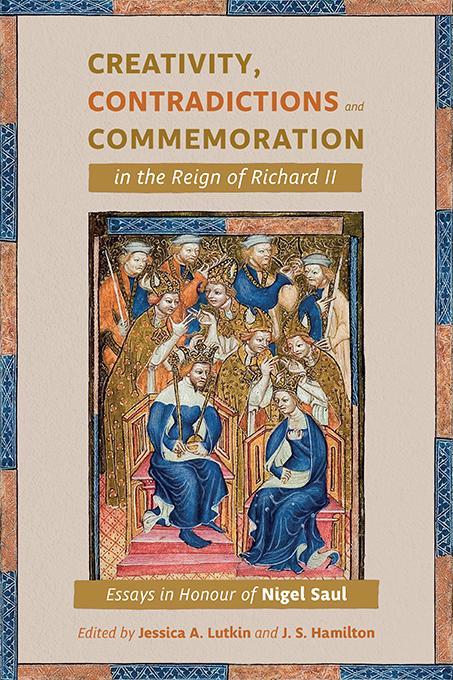 Creativity, Contradictions and Commemoration in the Reign of Richard II
Creativity, Contradictions and Commemoration in the Reign of Richard II 9 - Richard II’s Bishops: Fair Weather Friends?
Published online by Cambridge University Press: 26 May 2022
Summary
Unfortunately, Bishop Merke of Carlisle was all too prophetic when he denounced the deposition of Richard II and the accession of Henry IV in 1399. His bold and ringing denunciation, as shaped by Shakespeare in Richard II, is perhaps not too far from what he actually said in his bitter view of both what was taking place and its probable consequences:
I speak to subjects, and a subject speaks
Stirr’d up by God, thus boldly for his king.
My lord of Hereford here, whom you call king,
Is a foul traitor to proud Hereford's king;
And if you crown him, let me prophesy,
The blood of English shall manure the ground
And future ages groan for this foul act. (Richard II, iv, i)
That Merke was prophetic is not of issue here, as our writ ends long before the woes he envisioned. Rather, in looking at the deposition of Richard of Bordeaux in 1399, our concern is with the stance taken and the roles played by the bishops of the seventeen English and the four Welsh sees. And within the episcopate, the stance of that ring of courtier bishops who had been so close to the king and who owed their appointments to this special relationship is our real point of focus. From the perspective of on-stage drama, it would be quite satisfying to posit the head-on confrontation of the two parties, one led by Thomas Merke for the Ricardians and the other by Thomas Arundel for Henry Bolingbroke and the Lancastrians, with some poetic license by our later-day playwright helping bring matters to a head. This narrow interpretation or perspective allows us to offer the about-to-be restored Archbishop Arundel as the brains behind Henry's evolving views of his claims and ambitions and that this scenario is too simple is not one we will be called upon to unravel.
A little reflection about Richard's bishops in a collective sense before we turn to a more individualised treatment. As indicated, our special attention will be on those courtier bishops who had risen to the episcopate through intimate friendship with the king. These were – or might well have been – those ‘fair weather friends’ of our title and of our investigation into the role – or the lack thereof – that they, other than Merke, played when Richard's crown toppled and fell.
- Type
- Chapter
- Information
- Creativity, Contradictions and Commemoration in the Reign of Richard IIEssays in Honour of Nigel Saul, pp. 179 - 202Publisher: Boydell & BrewerPrint publication year: 2022
